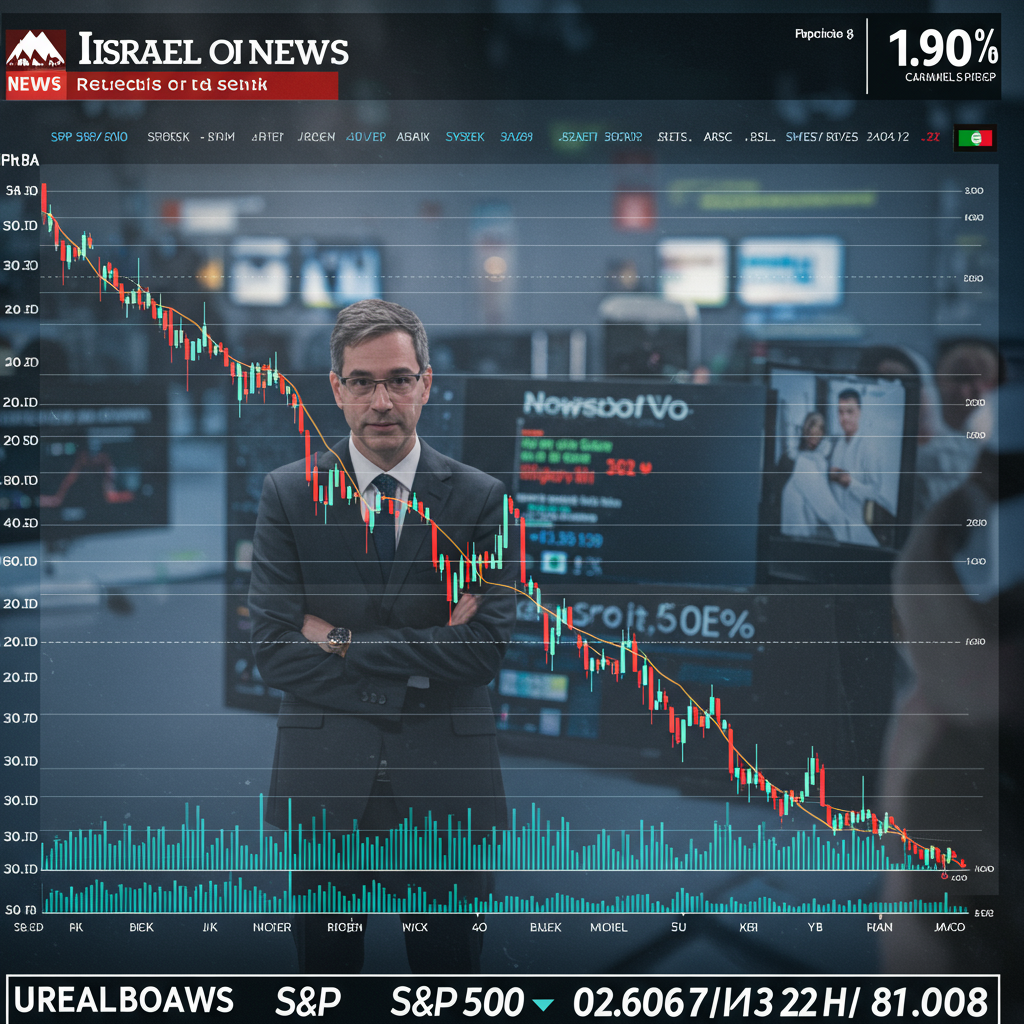U.S. stock markets closed a choppy trading session on Friday, June 20, 2025, with major indexes finishing mixed as investors closely monitored diplomatic efforts surrounding the Israel-Iran conflict. Oil prices retreated from recent highs amid signs that the U.S. might push for de-escalation talks.
Adding to the market’s uncertainty, the Federal Reserve earlier in the week kept interest rates steady but signaled concerns by raising its inflation forecast and lowering its economic growth outlook. Markets were closed on Thursday for the Juneteenth holiday.
For the day, the Dow Jones Industrial Average eked out a small gain of 0.1%. However, the S&P 500 gave up early momentum to close 0.2% lower, marking its second consecutive losing week. The Nasdaq Composite also finished down 0.5%. For the week, the S&P 500 dipped 0.2%, while both the Nasdaq and Dow managed slight gains.
Geopolitical Tensions Weigh on Sentiment
Geopolitical risk remained a significant factor influencing market sentiment. Attention was fixed on the Middle East, where tensions between Israel and Iran continued following Israeli strikes last Friday. President Trump stated he would take two weeks to decide on potential U.S. military action alongside Israel. While this pause appeared to be a pivot from recent rhetoric, diplomatic efforts reportedly failed on Friday, with European officials unable to convince Iran to halt its nuclear program. An Israeli official warned the conflict could become protracted.
This simmering tension had previously sent oil prices soaring to their highest levels since January in non-U.S. markets. However, on Friday, Brent crude, the international benchmark, slid approximately 2.5% to trade around $77.20 a barrel. This pullback was largely attributed to optimism that the U.S. might encourage negotiations between the two nations, potentially easing immediate concerns about oil supply disruptions.
Key Corporate Movers & Sector Performance
Friday saw notable swings in individual stocks based on earnings reports, analyst actions, and corporate developments. The Magnificent Seven stocks were mostly lower, though Apple (AAPL) bucked the trend with a more than 2% rise. Microsoft (MSFT), Broadcom (AVGO), Nvidia (NVDA), and Amazon (AMZN) registered declines of around 0.5% to 1%, while Meta (META) and Alphabet (GOOG) fell nearly 2% and over 3%, respectively.
Several companies experienced significant price movements:
Accenture (ACN) shares tumbled nearly 7%, making it the biggest decliner in the S&P 500. This steep drop occurred despite the professional services firm reporting quarterly revenue and earnings per share (EPS) that beat analyst estimates, partly boosted by demand for AI services. The primary driver for the decline was the company’s quarterly bookings figure, which fell significantly short of consensus expectations ($19.7 billion reported vs. $21.5 billion forecast), signaling weaker future business growth as clients appear hesitant to hire consultants amid the uncertain global economic backdrop.
Kroger (KR) stock surged nearly 10%, leading S&P 500 gainers. The grocery chain operator posted stronger-than-expected quarterly profit and identical sales growth (excluding fuel), boosting its full-year identical sales forecast despite acknowledging ongoing macroeconomic uncertainty.
Darden Restaurants (DRI), the parent company of Olive Garden and LongHorn Steakhouse, hit an all-time high, gaining over 2% and extending its year-to-date rise past 20%. The company comfortably beat earnings and revenue estimates, driven by robust same-store sales growth, particularly at Olive Garden and LongHorn. Darden also announced a new $1.0 billion share repurchase program.
CarMax (KMX) shares rose 6.6% after the used-car retailer topped quarterly profit estimates. The company saw a 6% year-over-year increase in total revenue, fueled by a 9% gain in retail vehicle unit sales, even as average selling prices softened slightly.
Smith & Wesson Brands (SWBI) shares plummeted almost 20% after the gunmaker reported falling profit and revenue and issued a warning about continued slowing sales. The company cited cautious consumer spending due to persistent inflation, high interest rates, and tariff concerns as key headwinds expected to persist in the near term.
Mondelez International (MDLZ) gained 3% following an upgrade from Wells Fargo, with analysts citing strong pricing execution and an anticipated recovery in earnings as inflation is expected to moderate in 2026.
In acquisition news, Home Depot (HD) saw a small gain following reports that it made an offer to acquire building products distributor GMS (GMS), which saw its shares jump a dramatic 24%. This potential bid follows an earlier offer for GMS made by QXO (QXO) just days prior.
Lithium miner Albemarle (ALB) dropped 4.6% after analysts maintained a cautious stance on the lithium market, citing ongoing oversupply and pricing pressure.
Steel Dynamics (STLD) slipped 3.2%, extending recent losses after issuing lower-than-expected profit guidance.
Crypto Legislation Fuels Stablecoin Rally, Hits Payments
A major legislative development influencing financial markets this week was the Senate’s passage of the GENIUS Act, which establishes a federal regulatory framework for stablecoins.
Shares of Circle Internet Group (CRCL), the largest U.S.-based stablecoin issuer, soared more than 20% on Friday, extending a significant rally that began since its IPO debut earlier this month. The GENIUS Act is viewed as a major catalyst for the digital currency industry, potentially paving the way for wider adoption of stablecoins by banks, fintech firms, and retailers.
Conversely, shares of payment giant Visa (V) declined earlier in the week following the GENIUS Act’s passage. Concerns arose that the legislation could empower merchants to bypass traditional card-based payment networks using their own stablecoins, potentially eroding Visa’s transaction fee revenue. Despite being little changed on Friday, Visa shares ended the week down about 4%. Technical analysis indicated potential selling pressure, with the stock showing a bearish divergence and trading below its 50-day moving average.
Bitcoin gave up early gains on Friday, trading around $103,500 in late afternoon. Shares of cryptocurrency exchange Coinbase (COIN) rose 4%, also benefiting from the GENIUS Act rally.
Breaking Corporate Development: Siyata Mobile (SYTA) is nearing the completion of a $180 million reverse merger with Core Gaming, a move designed to pivot the company into the AI-powered mobile gaming market. Core Gaming boasts a significant portfolio of over 2,100 games, over 700 million downloads, and 43 million monthly active users, with estimated 2024 revenue exceeding $80 million. The final hurdle for the merger, expected to close as the second quarter ends, is NASDAQ approval for the combined entity’s listing.
Tesla’s Robotaxi Future and Analyst Debate
While Tesla (TSLA) shares finished unchanged on Friday, the stock remained a focus of analyst attention ahead of the planned launch of its robotaxi service in Austin, Texas, this weekend (June 22).
Bullish analysts like Dan Ives at Wedbush suggested the robotaxi rollout, along with the future Cybercab, could propel Tesla’s market capitalization towards $2 trillion within 12 to 18 months. Ives views this autonomous initiative as the “golden goose” for the company and expressed optimism about a potentially favorable regulatory environment under a Trump administration, anticipating federal hurdles could be “fast-tracked.” Tesla also announced a significant deal to build a battery plant in China on Friday.
However, not all analysts share this high degree of optimism. Investment firm Baird recently downgraded Tesla, citing concerns that the projected expansion rate of the robotaxi program might be too ambitious. Argus Research also highlighted that the stock’s trading seemed influenced by “non-fundamental events,” including recent public friction between CEO Elon Musk and former President Trump, which they believe, along with the expiration of certain EV credits, could dampen vehicle demand. Meanwhile, Texas lawmakers have reportedly requested Tesla pause the robotaxi launch until new autonomous vehicle regulations take effect in September. Despite Friday’s flat finish, Tesla shares are down around 20% year-to-date, though they’ve recovered some ground recently. The robotaxi space is also becoming increasingly competitive, with Alphabet’s Waymo and Amazon’s Zoox actively expanding their autonomous vehicle services.
Other Market Movements
In the broader commodity markets, soybeans, corn, and wheat prices all closed lower on Friday, influenced by ongoing weather and geopolitical developments. Livestock markets saw mixed results, with live cattle and feeder cattle down, while lean hogs rose.
Treasury yields were mostly lower, with the yield on the benchmark 10-year Treasury note declining slightly to 4.38%. The U.S. dollar index dipped 0.1% on the day.


